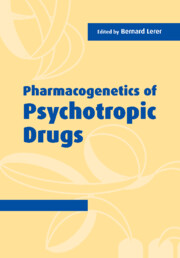Book contents
- Frontmatter
- Contents
- List of contributors
- Part I Introduction
- Part II Clinical background and research design
- Part III Molecular background
- 6 The psychopharmacogenetic–neurodevelopmental interface in serotonergic gene pathways
- 7 RNA processing regulation and interindividual variation
- Part IV Pharmacokinetics
- Part V Specific psychotropic drugs and disorders
- Part VI Pharmacogenetics and brain imaging
- Part VII Industry perspectives
- Index
6 - The psychopharmacogenetic–neurodevelopmental interface in serotonergic gene pathways
from Part III - Molecular background
Published online by Cambridge University Press: 20 August 2009
- Frontmatter
- Contents
- List of contributors
- Part I Introduction
- Part II Clinical background and research design
- Part III Molecular background
- 6 The psychopharmacogenetic–neurodevelopmental interface in serotonergic gene pathways
- 7 RNA processing regulation and interindividual variation
- Part IV Pharmacokinetics
- Part V Specific psychotropic drugs and disorders
- Part VI Pharmacogenetics and brain imaging
- Part VII Industry perspectives
- Index
Summary
OVERVIEW
Individual differences in drug effects and treatment response are relatively enduring, continuously distributed, and substantially heritable; they are, therefore, likely to result from an interplay of multiple genomic variations with environmental influences. As the etiology and pathogenesis of behavioral and psychiatric disorders are genetically complex, so is the response to drug treatment. Psychopharmacological drug response depends on the structure and functional expression of gene products, which may be direct drug targets or may indirectly modify the development and synaptic plasticity of neural networks critically involved in drug response. While formation and integration of these neural networks is dependent on the action of manifold proteins, converging lines of evidence indicate that genetically controlled variability in the expression of genes critical to the development and plasticity of distinct neurocircuits influences a wide spectrum of quantitative traits including treatment response. During brain development, neurotransmitter systems (e.g., the serotonergic system), which are frequently targeted by psychotropic drugs, control neuronal specification, differentiation, and phenotype maintenance. The formation and maturation of these neurotransmitter systems, in turn, is directed by an intrinsic genetic program. Based on the notion that complex gene–gene and gene–environment interactions in the regulation of brain plasticity contribute to interindividual differences in drug response, the concept of developmental psychopharmacogenetics is emerging. This chapter appraises prototypical genomic variation with impact on gene expression, and complementary studies of gene and environmental effects on brain development and synaptic plasticity in the mouse model.
Keywords
- Type
- Chapter
- Information
- Pharmacogenetics of Psychotropic Drugs , pp. 95 - 126Publisher: Cambridge University PressPrint publication year: 2002
- 1
- Cited by



